Do athletes need even more vitamins? Which nutrients are best for professional athletes? Just how can athletes boost their efficiency? These prevail questions we speak with our customers. In todays post, we ll delve into the very best supplements for athletes and their advantages for health and wellness.
Well also address typical sports nourishment misconceptions and offer insights on optimum nutrients for sports health and wellness.
Why Do Athletes Need Supplements?
If your body doesnt obtain the nutrients it requires, it can not work at its ideal. Reduced degrees of necessary nutrients can cause shortages and adversely effect athletic performance.
Although a well balanced diet regimen is essential, athletes usually require a lot more nutrients due to their enhanced exercise. When you sweat throughout workout, you lose essential nutrients such as sodium, chloride, magnesium, calcium, zinc, and potassium. Sometimes, keeping optimal nutrient levels may require additional supplements or specialised sporting activities drinks, especially if you follow a demanding physical fitness routine.
What Are the Best Supplements for Professional Athletes?
While all minerals and vitamins are very important, some are especially advantageous for athletes.Join Us monstersteroids.co website Belows a guide to nutrients to improve athletic performance and the vital vitamins for professional athletes:
B Vitamins
Each B vitamin- consisting of folate, thiamin, riboflavin, niacin, B6, B12, pantothenic acid, and biotin- plays a special duty in the body. B12, particularly, is essential for red cell production and DNA synthesis, which are essential for sports performance. Vitamins B12 and B6 help reduce tiredness and tiredness, and sustain the normal functioning of the nerve system and body immune system. Our B Facility supplement gives a wide variety of B vitamins that support general health and health and wellbeing.
Magnesium
Magnesium is understood for its role in muscular tissue and nerve function, yet it is involved in over 300 biochemical responses in the body. Research study shows that athletes might have greater magnesium needs, which can benefit efficiency and recuperation. Magnesium supports:
- Energy manufacturing
- Genetics maintenance
- Muscle mass function
- Protein synthesis
- Regular nerve function
Endurance athletes, particularly, could securely take in 500 to 800 mg daily, with ongoing disputes about whether greater quantities are helpful.
Vitamin D
Vitamin D is critical for various regulative procedures in the body, consisting of keeping a healthy body immune system, bones, and muscle mass. It additionally helps in electrolyte metabolic rate, protein synthesis, and genetics expression, all essential for both elite and entertainment athletes. Our high-dose vitamin D3 from AAVALABS includes 5000 IU per softgel capsule, incorporated with extra virgin olive oil for optimum absorption. This supplement is devoid of irritants, gluten, and GMOs, providing a top notch option for satisfying your vitamin D demands.
Taking one capsule every 5 days- equal to an everyday consumption of 25 micro; mini; g (1000 I.U., 500% RM)- can aid stop or remedy a vitamin D deficiency, specifically during the winter months.
Vitamin C
Also small vitamin C deficiencies can affect exercise performance. As an antioxidant, vitamin C safeguards muscle mass cells from oxidative damages, which helps in recovery and development. Furthermore, its essential for collagen formation, which is crucial for maintaining healthy and balanced ligaments, tendons, skin, and muscular tissues- essential concerns for any type of athlete.
Zinc
Low zinc degrees can result in lowered bone mineral thickness and raise the risk of fractures. Zinc is essential for collagen formation, bone healing, and stopping osteoporosis. Zinc supplements are commonly suggested for athletes to support these functions.
Various other valuable nutrients for athletes include potassium, salt, high levels of caffeine, nitrate, bicarbonate, beta-alanine, BCAA, and glutamine.
Sport Nourishment Misconceptions to Be Knowledgeable about
Recognizing the duty of nutrients is essential, but its just as essential to be knowledgeable about typical sporting activities nourishment myths. Worldwide of sporting activities, several misconceptions can mislead professional athletes.
Myth # 1: The More Protein You Consume, the More Muscle Mass You Will Certainly Gain
While healthy protein is important for muscular tissue development, most professional athletes can meet their healthy protein requires with a well balanced diet plan without added supplements. Healthy protein sources include fish, chicken, nuts, seeds, tofu, and vegetables.
Myth # 2: All Fat Is Unhealthy
Nutritional fats are crucial for general health and wellness. The trick is to select unsaturated fats over hydrogenated fats. Polyunsaturated fats, consisting of omega-3 and omega-6 fatty acids, are particularly beneficial for preserving health.
Misconception # 3: Supplements Are a Waste of Money
According to our Head of Item Growth, Libby, the misconception that we can obtain all needed nutrients from food alone is obsoleted. Nutrient-depleted dirts and differing dietary demands, such as veganism, suggest that food supplements are often essential to meet our dietary requirements.
Myth # 4: Energy Pubs Are the very best Way to Fuel an Exercise
While energy bars are convenient, they typically include preservatives, sugar, and emulsifiers. For healthier options, consider homemade treats that are free from artificial additives.
Striking a Balance Is Trick
One usual misconception regarding supplements is that more is better. This is not true, also for athletes. Supplements must match a healthy diet, not replace it.
Before incorporating supplements, ensure your diet regimen includes a range of fruits, veggies, healthy fats, grains, and healthy protein. Speak with a sporting activities physician or nutritionist to customize the appropriate supplement regimen to your specific requirements. Choosing the suitable supplements can improve your results better than randomly taking several products or overdosing.
As Libby says: Every individual has unique dietary and lifestyle needs- there is seldom a one-size-fits-all supplement recommendation.
rdquo;
